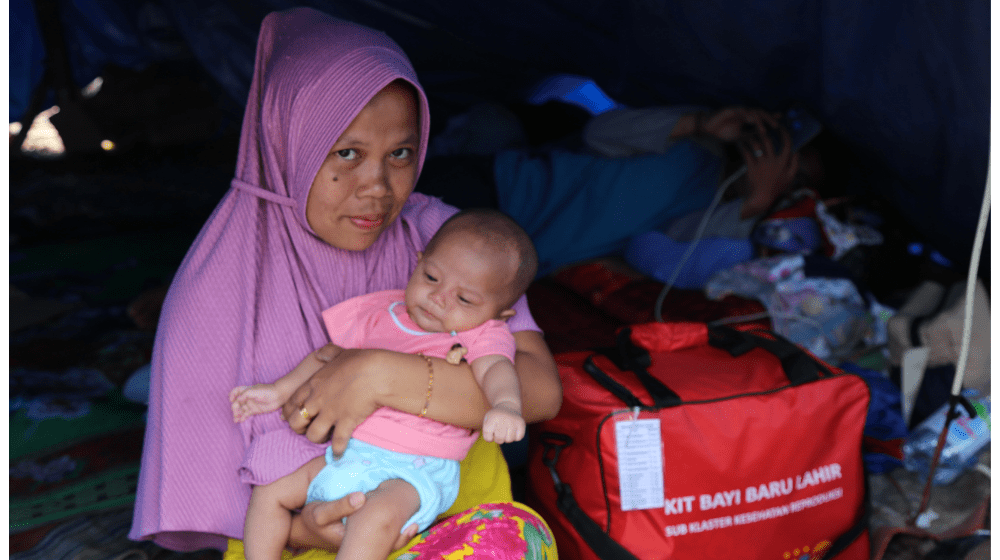Baby Muhammad Evano Saputra was born safely on 1 December 2022 evening at the reproductive health tent in Cugenang, Cianjur, West Java. Most of the healthcare facilities there were destroyed one day after the 5.6-magnitude earthquake hit Cianjur on 22 November. He was the sixth out of the 139 babies born in the reproductive health tent.
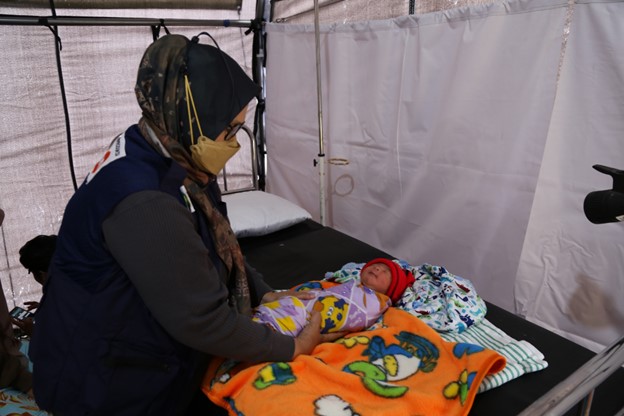
(Photo: UNFPA Indonesia/Lucky Putra)
One day after the earthquake that claimed 662 lives, left 114,683 people internally displaced, and destroyed more than 68,000 homes and public facilities (BNPB, 2023), the United Nations Population Fund (UNFPA) set up the reproductive health tent in Cugenang, one the five most affected sub-districts, under the coordination of the Ministry of Health, with support by the Australian Department of Foreign Affairs and Trade (DFAT).
In total, UNFPA’s humanitarian assistance from November 2022 to June 2023 reached 8,348 people affected by the Cianjur earthquake through delivery of reproductive health and gender-based violence services, distribution of dignity kits, and provision of cash voucher assistance (CVA) for pregnant women. (See the Cianjur disaster response SADDD here: bit.ly/DashboardEFCianjur2023).
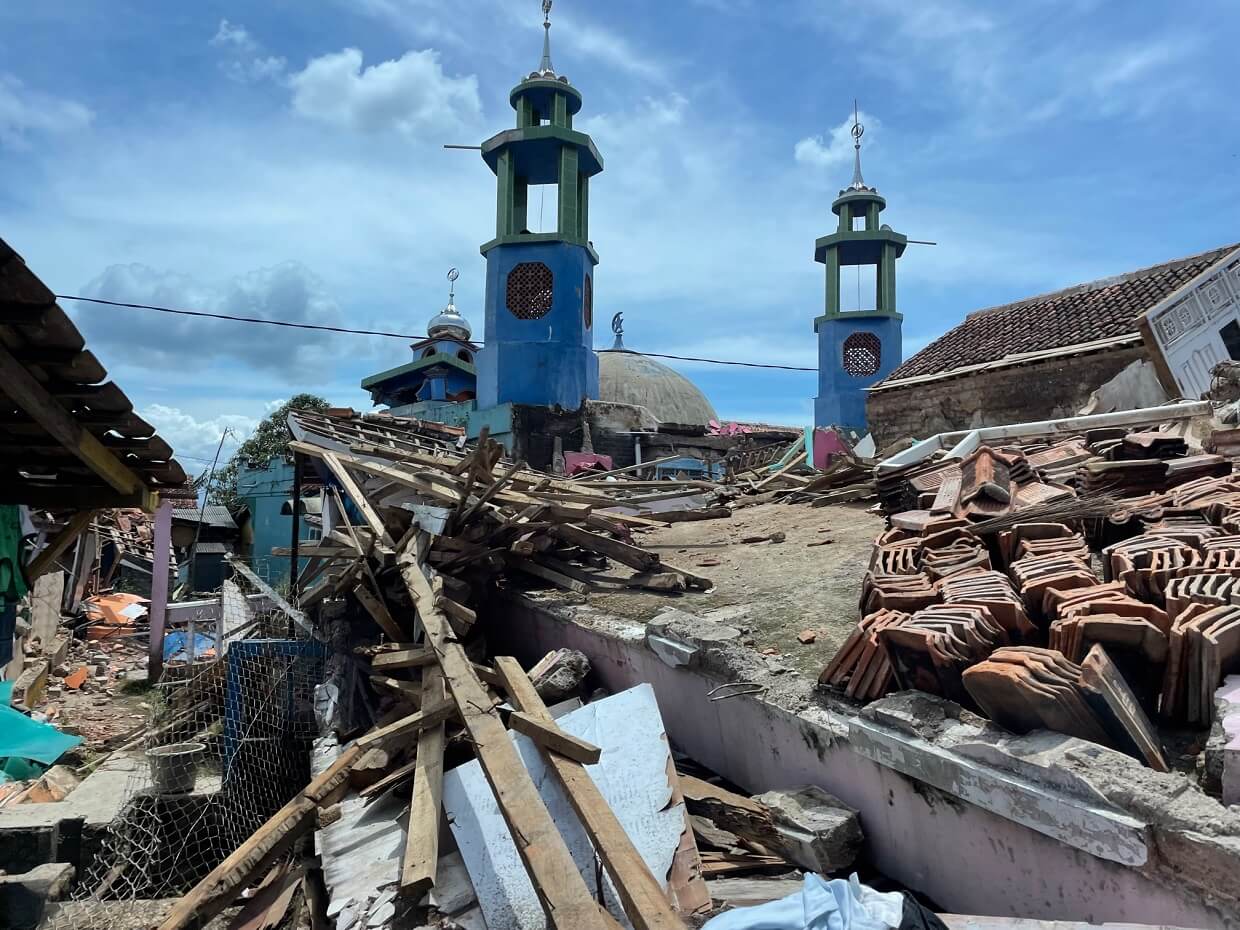
left 114,683 people internally displaced, and destroyed more than 68,000 homes
and public facilities.
(Photos: UNFPA Indonesia/Rahmi Dian Agustino)
Sexual and Reproductive Health Services Save Lives
“This is our first child, praise be to God, after being married for about a year and a half. We are thankful for the help… the midwife also helped with naming the baby,” said Wulan and Farhan the young parents of Evano. After the earthquake left her house and her father’s house in ruins, Wulan and her family have had to live in a makeshift shelter. Although unsure of what future awaited their family, they were grateful that Wulan could give birth safely and they had the aid, including dignity kits, that she and her baby need to survive for the time being.
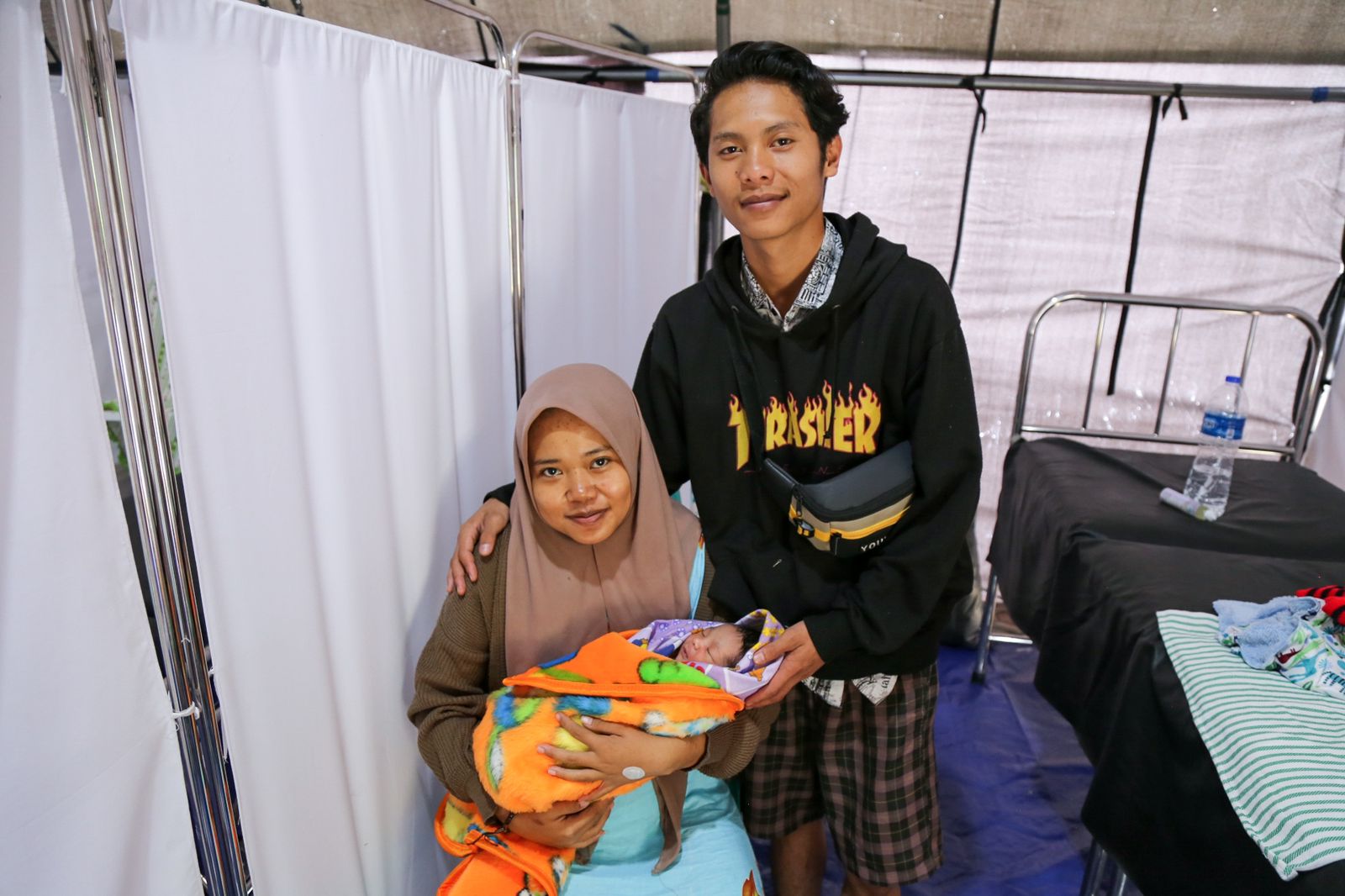
(Photo: UNFPA Indonesia/Lucky Putra)
“Thankfully the tent has sufficient equipment even though we’re in an emergency situation… We want to make it as comfortable and pleasant as possible for welcoming new lives into the world,” said Sri Rezeki Utami, the midwife from Jakarta who helped with the delivery.
Women do not stop giving birth during emergencies. That’s why meeting the needs of pregnant women is one of UNFPA’s priorities in disaster response.
“We must provide services for pregnant mothers. Where would they go if we’re not there for them?” Sri affirmed. “Everybody has the right to receive proper services no matter the circumstances.” In the closing of the Cianjur humanitarian response in June, Rina Yudiantini, Head of Family Health & Nutrition Section of Cianjur District Health Office, echoed Midwife Sri’s message. “Childbirth cannot be delayed. It can even happen faster due to stress. Praise be to God that there was no maternal death during the emergency response… It’s incredible,” she said.
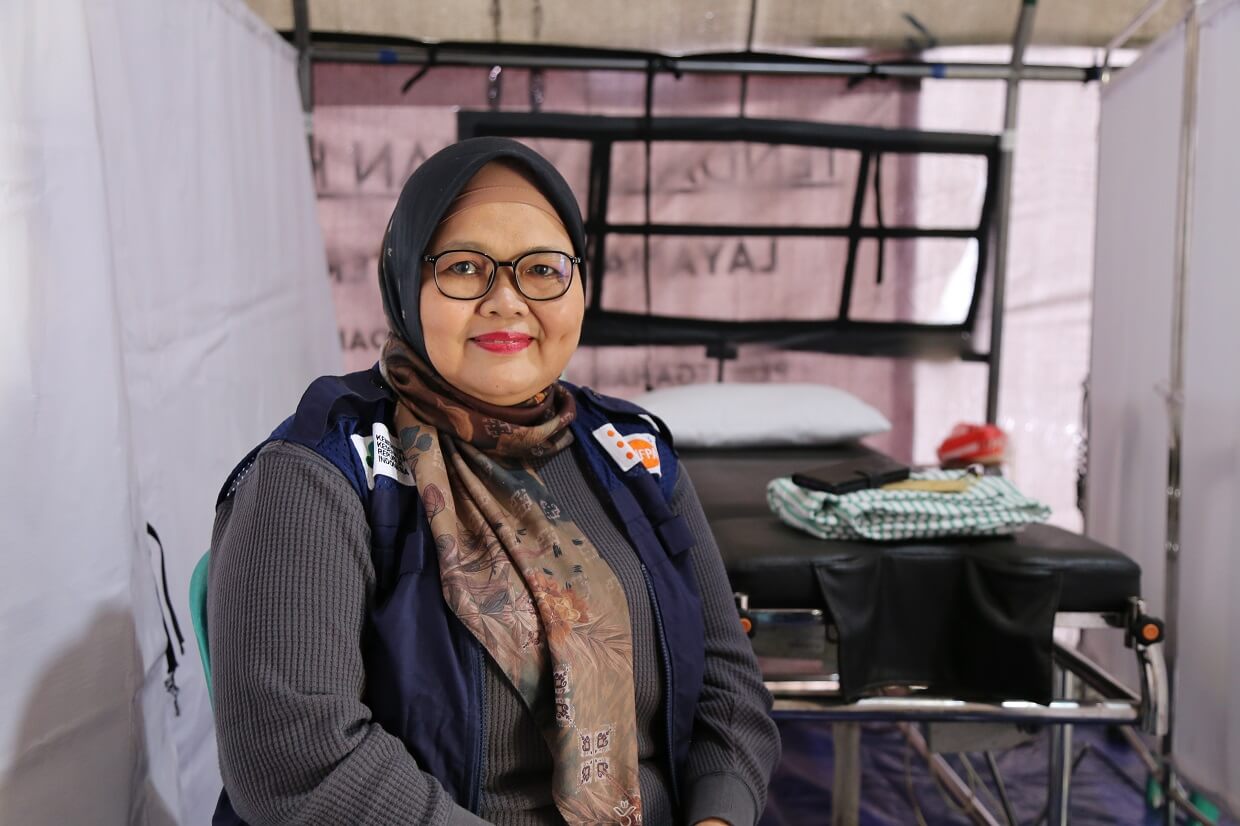
(Photo: UNFPA Indonesia/Lucky Putra)
In partnership with members of the Reproductive Health sub-cluster to support provision of Minimum Initial Service Package (MISP), including DoctorShare, Yayasan Kerti Praja, Indonesian Midwives Association (IBI), and Americares, UNFPA built two more reproductive health tents in Cijedil and Warung Kondang sub-districts. At all three tents, 194 babies had been delivered safely and 2,026 women had accessed antenatal and postnatal care services (ANC and PNC) and counseling provided by IBI from November 2022 to June 2023. “‘More than 200 health workers helped with the provision of MISP for reproductive health and psychosocial support in three districts,” Yosep from DoctorShare said.
“Collaboration is critical in disaster response. We want to reach the most vulnerable, like pregnant women, older persons, people living with HIV, and people with disabilities,” said Elisabeth Sidabutar, UNFPA Indonesia Humanitarian Programme Analyst. “We have zero tolerance for preventable maternal deaths, unmet need for family planning, and gender-based violence, including in disaster settings.”
After the earthquake, many people have lost not only their houses but also sources of income. Many pregnant women face higher risks in their pregnancy due to halted access to the healthcare services they need to ensure their pregnancy is healthy and the delivery of their baby is safe. In response, UNFPA provided CVA to 200 pregnant women in Cianjur, receiving Rp 1,200,000 from March to June 2023, in collaboration with Yayasan Kerti Praja and support from the Emergency Response Fund.
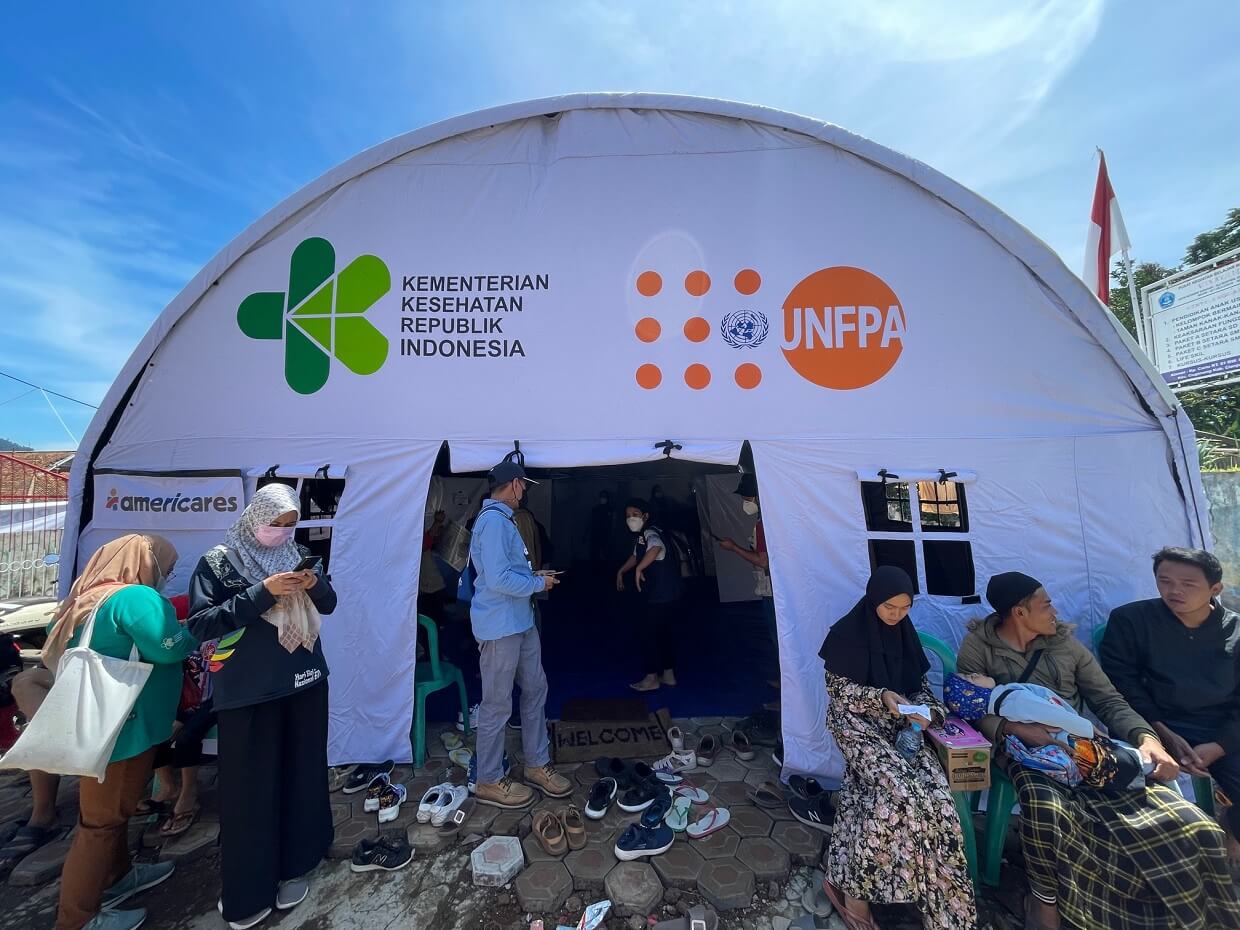
(Photos: UNFPA Indonesia/Rahmi Dian Agustino)
With the cash assistance, Susanti, a housewife from Mangun Kerta village who was 8 months pregnant with her third child, could access ANC and afford vitamins and milk. Her husband works as a freelance automotive body technician who has received fewer orders since the earthquake. “This is the first time that I have received this kind of assistance. My family’s income has been very unstable, so it has really helped,” she said.
Yuyun, who was also pregnant with a third child, sells food at home while her husband works in construction. “With the assistance, I could check my pregnancy with the midwife more regularly. I have also used the money for ultrasonography (USG) and other needs such as diapers,” Yuyun said. Both Susan and Yuyun emphasized the importance of universal access to healthcare, especially for the underprivileged.
As part of the CVA package, Susan and Yuyun also attended meetings with midwives and other pregnant women in the village to discuss healthy pregnancy tips, nutritions, family planning, and many others. “We
gained more friends and new knowledge from the sharing sessions and also the Whatsapp group,” they said.
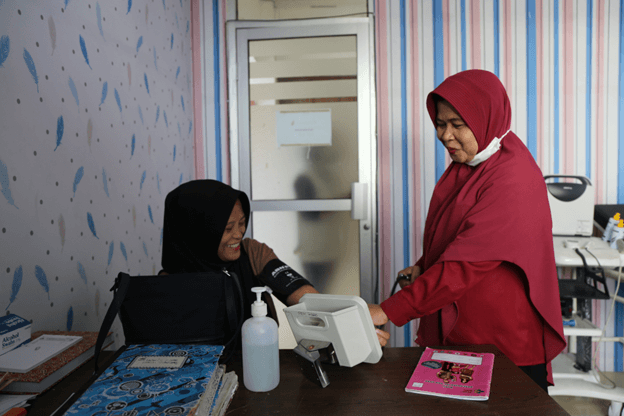
(Photo: UNFPA Indonesia/Rahmi Dian Agustino)
Protecting Women and Girls from Violence Saves Lives
In Cianjur, around 52% of internally displaced persons affected by the earthquake are women and girls, and all of them face an increased risk of GBV in the aftermath of the disaster.
The Minister of Women Empowerment and Child Protection (KPPPPA), Bintang Puspayoga activated the GBV sub-cluster on 29 November with the National Disaster Management Authority (BNPB) and the Ministry of Health, with support by UNFPA as the GBV technical support focal point. “When it comes to the protection of women and children… especially those at the displacement tents, we need to synergize and collaborate,” Minister Bintang Puspayoga affirmed.
As part of the Pulih Bersama C-Surge Project supported by DFAT, UNFPA also collaborated with BNPB and KPPPA to train enumerators on the utilization of baseline population and online rapid disaggregated data collection tools for disaster response. Family resilience motivators (Motekar) of the Cianjur district Office of Population Management, Family Planning, Women Empowerment, and Child Protection (DPPKBP3A) and other volunteers collected the sex, age, disability disaggregated data (SADDD) for the Cianjur earthquake humanitarian response to make sure that the needs of women and girls affected by the Cianjur earthquake are prioritized. For five days, 70 enumerators surveyed the five most impacted sub-districts out of a total of 11 sub-districts affected.
“We found many cases of violence against women in displacement tents due to difficult access to clean water and lack of security measures in sanitation facilities. The majority of the victims are girls aged 12-19 years,” Hj. Ovi Simanjuntak, a volunteer who was also affected by the earthquake, revealed. “These cases are mostly mediated by the community leaders because there’s no proper reporting mechanism yet. So we educated them and provided psychosocial support.”
In collaboration with KPPPA, Cianjur Office of Women Empowerment and Child Protection (DP3A), and Americares, UNFPA supported three women-friendly spaces called Saung Sapa (Best Friend of Women and Children/Sahabat Perempuan dan Anak) to provide safe spaces for women and children and deliver the support that they need, including mental health and psychosocial support (MHPSS).
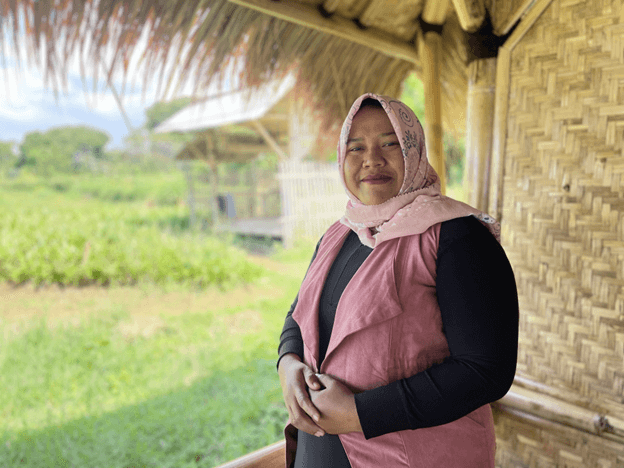
according to Erma.
(Photo: UNFPA Indonesia/Rahmi Dian Agustino)
One of the Saung Sapa established was initiated by Erma, a Motekar and volunteer for the Indonesian Planned Parenthood Association (PKBI), who allowed the community to use her new house, which was one of the only two houses that survived the earthquakes in her neighborhood in Cibeureum, as a public kitchen and women-friendly space where women can socialise, gain a support system, and learn critical things like GBV prevention and economic opportunities.
“Women-friendly spaces are very important in post-disaster settings like this because women need a space to be empowered and independent, and to collaborate with others. Therefore, they don't become dependent on their husband nor humanitarian assistance,” Erma said.
_________
Rahmi Dian Agustino
Communications Analyst, UNFPA Indonesia

